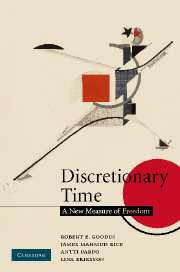Book contents
- Frontmatter
- Contents
- List of figures
- List of tables
- Preface
- Part I Introduction
- Part II Time pressure
- Part III Welfare regimes matter
- 7 How welfare regimes differ
- 8 A temporal perspective on welfare regimes
- 9 Welfare regimes and temporal autonomy
- Part IV Gender regimes matter
- Part V Household regimes matter
- Part IV Conclusions
- Appendix 1 Methodology
- Appendix 2 Data
- Bibliography
- Index
9 - Welfare regimes and temporal autonomy
Published online by Cambridge University Press: 28 October 2009
- Frontmatter
- Contents
- List of figures
- List of tables
- Preface
- Part I Introduction
- Part II Time pressure
- Part III Welfare regimes matter
- 7 How welfare regimes differ
- 8 A temporal perspective on welfare regimes
- 9 Welfare regimes and temporal autonomy
- Part IV Gender regimes matter
- Part V Household regimes matter
- Part IV Conclusions
- Appendix 1 Methodology
- Appendix 2 Data
- Bibliography
- Index
Summary
So what have we learned about welfare regimes, by looking at them through a temporal lens? Judging from the effects of state taxes, transfer payments and child-care subsidies – which are only parts of the ‘welfare regime’, but important parts – the following broad-brush conclusions emerge.
In general, people have more temporal autonomy in social-democratic regimes. They have about 5 hours a week more discretionary time there than in corporatist and liberal regimes, which are similar to one another in this respect. That is largely due to factors outside the scope of our study. Those may or may not be social, political or economic factors that would fall under the rubric of the ‘welfare regime’ or ‘welfare society’, conceived more broadly than our data permit us to explore.
Budgets must broadly balance, in temporal terms as well as financial ones. Governments can provide people with benefits and subsidies that increase their discretionary time only by collecting taxes that reduce the discretionary time. Given the complex operationalizations described in chapter 2, however, money does not translate straightforwardly into discretionary time on a one-for-one basis. So depending on whom exactly they take the money from and whom exactly they give it to, tax-transfer policies can have either negative or positive overall effects on temporal autonomy.
In most of the countries under study, the net effect of government taxes, transfers and child-care subsidies is to reduce temporal autonomy slightly, averaging across the population as a whole.
- Type
- Chapter
- Information
- Discretionary TimeA New Measure of Freedom, pp. 149 - 150Publisher: Cambridge University PressPrint publication year: 2008



